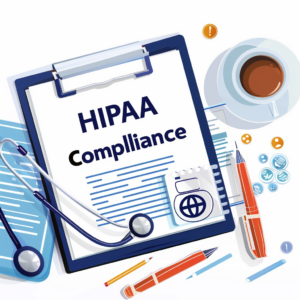
08 May HIPAA Compliance: Navigating the Complexities in Record Retrieval

Did you know that over 133 million patient records were breached in the United States in 2023 alone? Protecting sensitive medical information is critical. Ensuring HIPAA compliance safeguards patient data privacy and upholds confidentiality.
Understanding the importance of maintaining secure medical records is key to safeguarding your patients’ trust and complying with regulations. Learn how to navigate the complex landscape of patient data protection to avoid costly breaches and maintain the integrity of your practice.
Table of Contents
Understanding HIPAA and Its Importance
You must ensure that HIPAA regulations are strictly followed to safeguard patient data. Violating HIPAA can lead to severe consequences, including hefty fines and legal action.
To comply with HIPAA, healthcare providers must secure electronic medical records, limit access to patient information, and train staff on privacy protocols. Regular audits are essential to ensure ongoing compliance.
Patient data protection maintains trust and confidentiality. Breaches not only harm patients but also damage the reputation of healthcare organizations.
Navigating Complexities in Compliance
Complying with regulations for medical records privacy and protecting patient data can feel overwhelming. It’s important to keep up with the latest legal developments that influence HIPAA compliance.
Seek expert guidance or training to interpret and implement compliance measures accurately. Stay informed about any recent legal cases that have influenced HIPAA compliance, as they offer valuable insights into best practices and potential pitfalls to avoid.

Regularly review and update your organization’s policies and procedures to ensure ongoing HITECH and HIPAA compliance. Conducting regular risk assessments can help identify potential vulnerabilities in your data security practices and address them proactively.
By investing in proper training and staying up-to-date on HIPAA regulations and legal developments, you can mitigate the risk of non-compliance penalties and protect the sensitive information of their patients effectively. Compliance is an ongoing process that requires dedication and attention to detail.
Engaging with real-world examples of organizations facing consequences for non-compliance can provide practical lessons on the importance of upholding patient data protection. By staying proactive and vigilant in your approach to compliance, you can protect both your patients’ sensitive information and your organization’s reputation.
Insights and Solutions for Compliance Challenges
Understanding and implementing HIPAA regulations can be challenging for organizations. The complexity of the regulations, coupled with the ever-evolving nature of technology, makes it challenging to ensure full compliance.
However, there are effective methods that you can adopt to manage these regulations efficiently. This includes investing in robust cybersecurity measures, conducting regular staff training on data security protocols, and implementing strong encryption techniques to protect patient information. When it comes to medical records privacy, ensuring that only authorized individuals access sensitive information is vital. Implementing robust patient data protection measures is essential.
To maintain HIPAA compliance, conduct regular audits to assess your organization’s adherence to regulations. Training your staff on privacy protocols can significantly increase compliance efforts. Healthcare providers must also implement backup systems and disaster recovery plans to ensure that patient data remains accessible in case of emergencies or system failure
HIPAA Privacy Rule
The Privacy Rule is the first regulation to follow. It requires healthcare providers to safeguard patients’ personal health details and not reveal them without permission. Your medical history cannot be shared by your doctor unless you authorize it.
- Maintain patient privacy
- Monitor information disclosures
- Share only necessary data
- Inform individuals about their PHI usage
HIPAA Security Rule
Healthcare providers must also adhere to the Security Rule, which mandates the implementation of safeguards to ensure the protection of electronic health information. These safeguards encompass encryption, access controls, and routine security audits to deter unauthorized access or breaches.
Administrative safeguards
Physical Safeguards
Technical safeguards
Breach Notification Rule
Lastly, the Breach Notification Rule mandates that healthcare providers notify patients in the event of a data breach that compromises their protected health information. This transparency allows patients to take necessary steps to protect themselves from potential harm resulting from the breach. By adhering to these three rules, healthcare organizations can ensure compliance with HIPAA regulations and maintain the confidentiality and integrity of patient data.
According to HIPAA regulations, large breaches must be reported within 60 days of discovery, while small breaches should be reported within 60 days of the end of the calendar year. This reporting requirement helps in maintaining transparency and accountability in handling sensitive medical records. By reporting breaches in a timely manner, healthcare providers can take necessary actions to mitigate the impact on affected patients and prevent further unauthorized access to their data. When a data breach occurs, it is essential for healthcare organizations to conduct a thorough investigation to determine the extent of the breach and identify the root cause.
This process involves analyzing how the breach occurred, what information was compromised, and assessing the potential risks to patients and the organization. By understanding the nature of the breach, healthcare providers can implement targeted security measures to prevent similar incidents in the future.
In addition to reporting data breaches, healthcare organizations are also required to notify affected individuals about the breach as soon as possible. This notification allows patients to take necessary precautions to protect their information and helps in building trust between patients and healthcare providers. Transparency in communication is key to maintaining patient confidentiality and upholding ethical standards in handling medical records.
Strategies for Digital Record Retrieval
To streamline record retrieval, implement electronic health record (EHR) systems. These systems enable quick and secure access to patient data, enhancing record management efficiency. Another effective strategy is to utilize cloud-based storage solutions. Storing medical records in the cloud facilitates easy and remote access to records, promoting flexibility and scalability.
Implementing strict access controls is essential for safeguarding patient data during retrieval processes. By restricting access based on roles and permissions, you can prevent unauthorized individuals from viewing sensitive information.
Data encryption enhances the security of record retrieval processes. Encrypting medical record data ensures that even if unauthorized access occurs, the information remains protected and unreadable.
Incorporating automated indexing and search functionalities can significantly expedite the retrieval of specific records, reducing manual effort and minimizing errors in locating crucial patient information.
American Retrieval’s Personalized Approach
With HIPAA compliance and patient data protection, a personalized approach to record retrieval offers the most efficient solution. By tailoring the process to your specific needs, we can streamline the retrieval of medical records while ensuring compliance with privacy regulations.

Reduce the cost, time and headaches involved with obtaining medical records with American Retrieval Company
Questions or need more information? Call 763.233.7300 or email us at info@americanretrieval.com to schedule a demo today.
Efficient Solutions
Expert Guidance
American Retrieval provides dedicated support to help you navigate the complexities of medical record retrieval. Our team offers valuable insights, ensures accuracy in healthcare documentation, and assists in addressing any compliance challenges you may encounter.
Get ahead with American Retrieval Company – Industry’s fastest turnaround time for your needs. Discover efficiency like never before.
Keeping Patient Information Secure
Ensuring patient information security is critical in adhering to HIPAA regulations. Implementing effective tactics and innovative approaches can help effectively manage potential obstacles. Retrieving digital records quickly helps efficiency and keeps data safe and legal.
Be proactive in getting medical records and following the rules. Use personal strategies, new technology, and ask for help if needed. Protecting patient data builds trust and keeps healthcare running smoothly.


